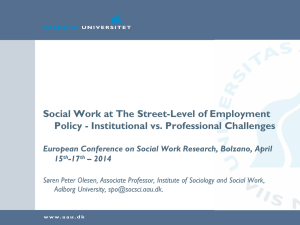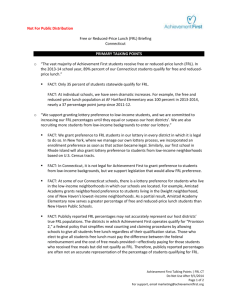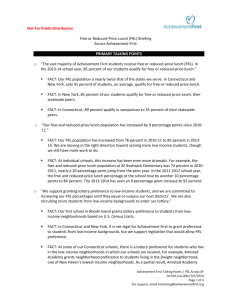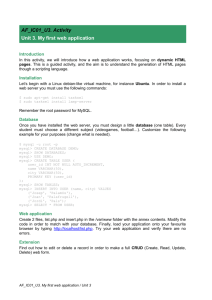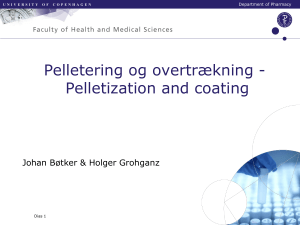Danish Case
advertisement
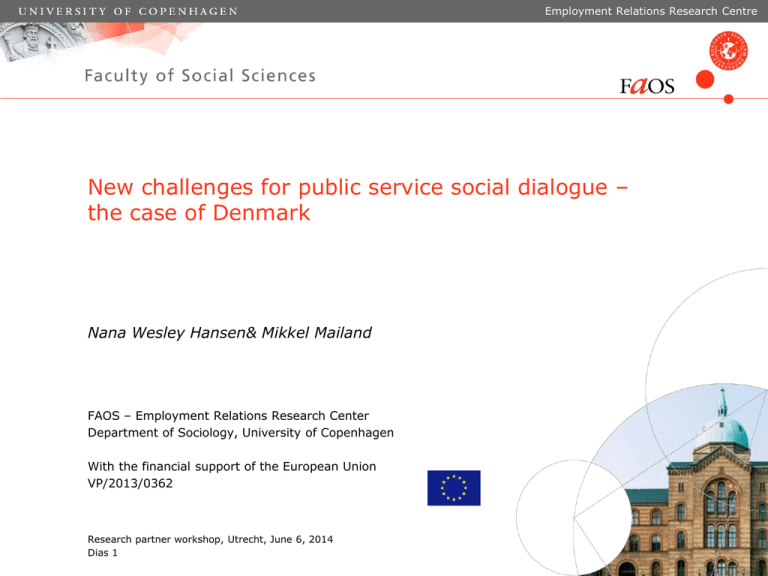
Employment Relations Research Centre New challenges for public service social dialogue – the case of Denmark Nana Wesley Hansen& Mikkel Mailand FAOS – Employment Relations Research Center Department of Sociology, University of Copenhagen With the financial support of the European Union VP/2013/0362 Research partner workshop, Utrecht, June 6, 2014 Dias 1 Employment Relations Research Centre Schools in Denmark • The Danish Folkeskole, founded in 1814 (Folkeskole Act) • Primary and lower secondary education, i.e. grade 0 to 6 and grade 7-9/10. • 2013: 1.312 public schools and 548 private schools. Less than a fifth of all students attended private schools • Reformed several times – latest 2013/14 (major conflict in collective bargaining round 2013 – teachers working time ) Sted og dato Dias 2 Employment Relations Research Centre Schools in Denmark - service users Parents • 1934 parents gained the right to involvement - school councils • 1935 The National Association of School Parents’ (Skole og forældre) formed • 1989 school boards introduced through legislation Pupils • ‘Ad hoc student involvement/councils 1960 and 70’ies • 1969 first national organization formed on Folkeskole level • 2004 Danish Schoolchildren (Danske Skoleelever, DSE) formed on the basis of a merger of two separate organizations • Represented in school boards and student councils Other • Industrial associations, local cultural and sports clubs Sted og dato Dias 3 Employment Relations Research Centre Schools in Denmark – levels/scope of involvement Level Actors Issues National National Association More than 30 official committees and of School Parents working groups involving amongst other: Partnership on development of the school Assessment and advice on the academic level in the school Social inclusion in the school Student counselling ??? Indirect Danish School Children Municipal National Association Innovation and development of the of School Parents schools Evaluation Danish School Student involvement techniques Children Innovation and development of the schools Other actors: local Ad hoc innovation and development of culture and sports the schools clubs, industrial associations etc. Sted og dato Dias 4 Direct/ indirect Indirect Indirect Indirect Direct Employment Relations Research Centre Schools in Denmark – levels/scope of involvement Level Actors School School board Principels (parents, the organization of teaching (i.e. the number of pupils, staff, lessons for each grade, the length of the school day, managem.) elective courses and special courses) the collaboration between school and home evaluation on students achievement in class the distribution of work among the teachers social events, afterschool arrangements. approval of educational materials general rules and values of the school approval of the yearly school budget All matters of significance to the student body Student council Other actors: Directly involved in the service delivery Class Issues Direct/ indirect Indirect Indirect Direct Parents General rules for social interaction in the class Individual pupils assessment/development Indirect/ Direct Pupils Class rules for social interaction etc. Individual pupils assessment/development Indirect/ Direct Sted og dato Dias 5 Employment Relations Research Centre Schools in Denmark –consequences/pressure? • The National Association of School Parents’ (Skole og forældre) • Danish Schoolchildren (Danske Skoleelever, DSE) Versus • Local Government Denmark (LGDK) (employers org) • The Danish Union of Teachers (DLF) • The Danish Association of School Leaders • Early Childhood and Youth Educators (BUPL) National/sector level results • Variance in representative base! • More about discourse than actual pressure! • Strengthened management focus! Sted og dato Dias 6 Employment Relations Research Centre Hospitals in DK – structure and user involvement drivers Hospital structure • Regions responsible for 53 public hospital employing 107.000 • 30-someting private hospitals/clinics – reduced recently - suppliers User involvement history in hospitals • User involvement long history, but more attention since late 2000s • Within last three years all actors sign up, you cannot be against it. Actors seen as paying more than lip-service to the term • Users often seen as patients and relatives, but sometimes broader • Actors have different understanding/emphasis diff. dimensions • Why: 1) problem pressure; 2) budget pressure/saving attempts; 3) research and policy learning from USA and UK; 4) first umbrella user involvement org. 2007; new patient roles and demands • Basic forms: single treatment process, research and health sector Sted og dato Dias 7 Employment Relations Research Centre Hospitals in DK – service users and other actors The user organizations • Danish Patient set up 2007, 17 member-org. Covers 79 org. • Appoints members to more than 100 councils etc. • Responsible for a foundation-funded knowledge-center for userinvolvement Other key actors in user involvement • Ministry of Health/National Health Authority • Public hospitals • Private hospitals/clinics • Five regions and their employer org. Danish Regions • Trade unions (for doctors, nurses and nurse-assistants) • (Municipalities and their empl org Local Government Denmark) • (General practitioners) Sted og dato Dias 8 Employment Relations Research Centre Hospitals in DK – forms, levels and scope of user invol. Organizational involvement aka indirect involvement • Sector (health): No permanent body, but Danish Patients now nearly always consulted. Sometimes invited together Danish Regions and TUs. Legal demand for invol.,but hearing is enough • Region: Recently legal demand for ‘user councils’, only patient representatives. Broad aims and competences in health area. • Hospital/department: No legal demand. Great variation. Include apart from patient reps and patients org reps, also employee reps and management reps. Advisory to management. • Interviewees find in indirect involvement huge variation, no or broad aims and different understandings between actors Individual involvement aka direct involvement • Standard ‘talk with patient’, extented ‘involving talk with patient’ • ‘Informed approval’ , extended ‘joint decision making’ Sted og dato Dias 9 Employment Relations Research Centre Hospitals in DK – consequences etc. for social dialogue Social dialogue in health sector • The word ‘social dialog’ not used • Collective bargaining and employee involvement well-developed and found on sector, region and hospital/department levels Four preliminary findings of SD relations to user involvement • Social dialogue (bargaining + involvement) and user invol takes place on different decision-making arenas. Formally no overlap • Social partners and user organizations meet on user involvement arena, not on social dialogue arena • No signs user invol substitute social dialogue. Mutual recognition of roles in user invol, but social partners not seen as first movers • Could indicate purely complementary arenas w. no cross-effects, but 1) TU see user invol as possibility for influencing policy, 2) indirect effect on work org and work intensification, 3) User demands taking into social dialogue arena by TU and employers Sted og dato Dias 10
